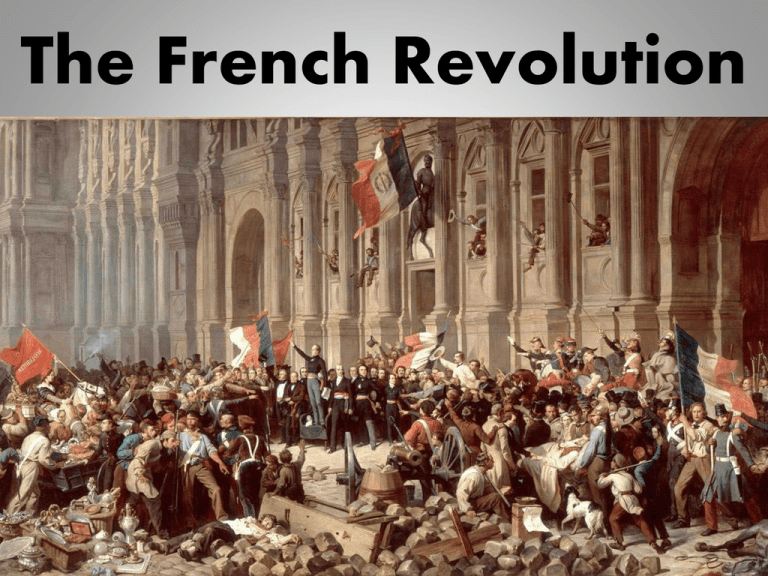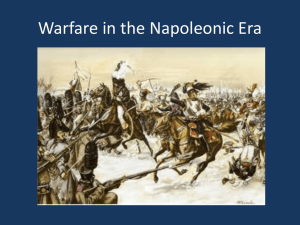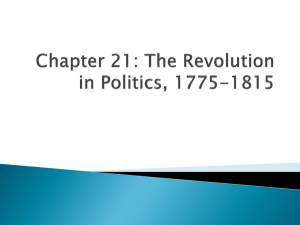The French Revolution
advertisement

The French Revolution Vocabulary Chapter 7 Section 1 1.Old Regime 2.Estate 3.National Assembly 4.Estates-General 5. Tennis Court Oath The Old Order • France was divided in three estates – First Estate- Roman Catholic Church clergy – Second Estate- Rich Nobles who owned 20 percent of the land. – Third Estate- 97 percent of the population. Composed of middle class, workers, and peasants ½ of third estates income went to taxes. Led to strong feelings of resentment and a desire for change Forces of Change • Enlightenment Ideas- The Third Estate was inspired by Enlightenment ideas that questioned the role of the government. They began to demand equality, liberty and democracy. • Economic Troubles- Frances economy was in decline due to over spending by the French monarchy. Louis XVI tried to tax the nobility to pay off France’s debt. The second estate called a meeting of the Estates- General to approve the new tax. Think- Pair Share • Why were members of the Third Estate dissatisfied with life under the Old Regime? • Were changes in the French government inevitable? Explain. Dawn of Revolution • The National Assembly- The Third estate formed the National Assembly in response to the tradition of always being outvoted in the EstatesGeneral by the First and Second estates. The Tennis Court Oath was the pledge made by the Third estate(National Assembly) to create a new constitution. • Storming the Bastille- In response to fear of the government using military force, people started to search for weapons which led to a storming of the Bastille(a prison), today this day is celebrated as a symbolic act of revolution. The Great Fear Sweeps France • The Great Fear- A wave of violence called the great fear swept the country. Peasants revolted and turned to violence. In 1789, women marched to Paris and demanded that the king lower prices of bread and end hunger in the city. The king and queen fled the city. Their exit signaled the change of power and radical reforms about to overtake France. Vocabulary Chapter 7 Section 2 1. Legislative Assembly 2. Sans-culotte 3. Guillotine 4. Robespierre 5. Reign of Terror The Assembly Reforms France • The National Assembly adopted a statement of revolutionary ideals. The Declaration of the Rights of Man and of the Citizen. The document stated “men are born and remain free and equal in rights” and those right included “liberty, property, security, and resistance to oppression” • Church Reforms- The Catholic church lost both its lands and political independence. Proceeds from the sale of the land helped pay off France’s huge debt. Divisions Develop • A Limited Monarchy- The National Assembly completed a new constitution. It stripped the king of much of his authority, and created the Legislative Assembly. • Factions Split France- The Legislative Assembly split into three groups over how to handle issues. Radicals- opposed monarchy, wanted deep changes Moderates- wanted some changes Conservatives- limited monarchy and a few changes Vocabulary Chapter 7 Section 3 1. Napoleon Bonaparte 2. Coup d’ etat 3. plebiscite 4. Napoleonic Code 5. Battle of Trafalgar Think- Pair- Share • What major reforms did the National Assembly introduce? • What did divisions in the Legislative Assembly say about the difference in French society? War and Execution • France at War- War began, the royal family was deposed. The Legislative Assembly set aside the constitution, dissolved the assembly and elected a new legislature called the National Convention. France was declared a republic, adult males granted the right to vote and hold office. • Jacobins Take Control- The majority of the people involved in the governmental changes were members of the Jacobins, a radical political organization. The Reign of Terror • Robespierre Assumes Control- A key Jacobin Leader, Maximilien Robespierre gained power in 1793. • The Reign of Terror- Robespierre’s ruler was known as the Reign of Terror and his chief task was to protect the revolution from “enemies”. • The End of the Terror- in 1794, members of the National Convention turned on Robespierre fearing their own safety and had him executed. The National Convention selected Napoleon Bonaparte a general to command France’s armies. Napoleon Seizes Power • In 1795, Napoleon led soldiers against French royalists who were attacking the National Convention. For this, he was hailed as the savior of the French Republic. • In 1799, Napoleon assumed power as a dictator. His sudden seizure of power is known as a coup d etat. • Napoleon restored peace in France by signing a peace treaty with Britain, Austria and Russia. Review Question Please list the positive and negative aspects of the Napoleonic Code. Napoleon Rules France • In 1800, by vote of a plebiscite Napoleon was given all real power as first consul. • Napoleon worked to restore order in France, by fixing the economy and ending corruption and inefficiency in the government. He set up lycees or public schools. He restored the power of the church • Napoleonic Code gave France a uniform set of laws and eliminated many injustices. • In 1804, Napoleon declared himself emperor of France. Napoleon Creates an Empire • Once Napoleon declared himself emperor, he yearned for more territory. • Napoleon’s conquest started with the loss of colonial possessions in Haiti and America. • During the first decade of the 1800s Napoleon had mastery of most of Europe. The French empire was huge but unstable. Its sudden collapse was caused by the actions of Napoleon. Vocabulary Chapter 7 section 4 1. Continental System 2. Guerrilla 3. Peninsular War 4. Scorched Earth Policy 5. Waterloo Napoleon’s Costly Mistakes • The Continental System- an attempt by Napoleon to forcibly close ports to prevent all trade and communication. It was intended to destroy Britain’s commercial and industrial economy. • The Peninsular War- Napoleon invaded Spain, the British sent troops to aid Spain, France lost 300,000 men. These losses weakened France. • The Invasion of Russia- Napoleon’s decision to invade Russia in late summer combined with Russia’s scorched earth tactic led French forces to fall victim to Russia’s deadly winter. France’s Grand Army of 420,000 = 10,000 left alive Napoleon’s Downfall • Napoleon Suffers Defeat- Prussian and Russian troops march into Paris and force Napoleon to surrender. Napoleon was banished to Elba. • The Hundred Days- Louis XVIII assumes power in France. He is unpopular among the peasants. Napoleon regains power after escaping from Elba. Allied powers defeat Napoleon at Waterloo. He is sent to St. Helena where he lives out his life imprisoned. Vocabulary Chapter 7 Section 5 1. Congress of Vienna 2.Metternich 3. Balance of Power 4. Holy Alliance 5.legitimacy Metternich’s Plan for Europe At the Congress of Vienna, Metternich insisted on three goals. First, he wanted to make sure that the French would not attack another country again. Second, he wanted a balance of power in which no one nation was too strong. Third, he wanted to put kings back in charge of the countries from which they had been removed, this principle was called legitimacy. The leaders agreed with Metternich’s ideas. An age of European peace began. Political Change Beyond Vienna • Across Europe, kings and princes reclaimed their thrones. Most of them were conservatives and did not encourage individual liberties. They did not want any calls for equal rights. • The Holy Alliance is formed to combat revolutions. The Concert of Europe reinforces the idea that stronger nations will assist each other if revolution breaks out. • People in the Americas also felt the desire for freedom. Many nations won independence from Spain. Italy, Germany, and Greece would rebel and form new countries. The French Revolution had changed the politics of Europe and beyond Review Questions 1. What were the three points of Metternich’s plan for Europe? 2. Explain legitimacy. Timeline Directions: Find dates of the following events, then create a timeline of the events. Waterloo The Great Fear Napoleon exiled to Elba Congress of Vienna Reign of Terror The Legislative Assembly Invasion of Russia Meeting of Estates-General The Hundred Days National Assembly Peninsular War Napoleon exiled to St. Helena Storming of the Bastille Napoleon Bonaparte Maximilien Robespierre Analyze The French Revolution G- Geography R- Religion A-Achievements P-Political System E- Economics S- Social Structure French Revolution Journal Write journal entries on four events during the French Revolution from the perspective of one of the following members of the three estates of the Old Regime: a peasant, a noble or clergy. Place yourself into the persona you have chosen and describe the following events and how they affect you personally: Life in the Old Regime Reign of Terror Napoleon’s Seizure of Power The Congress of Vienna









